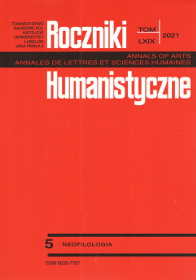Johann Georg Hamannʼs Sokratische Denkwürdigkeiten: A Polemic with Enlightenment Rationalism
Abstract
London, 1758 is a turning point in the life of Johann Georg Hamann (1730-1788). What happened that year in England’s capital was meaningful, and not just for Immanuel Kant, his adversary in Königsberg – Hamann’s London conversion turned him into a critic of the “Enlightenment philosophy of religion”. His Gedanken über meinen Lebenslauf should be considered as analogous to Augustineʼs Confessions.
Hamann merits special attention in the context of the discourse of the “return of religion” and “New Atheism.” The groundbreaking analysis of the institutionalised power of “the public” (Öffentlichkeit), which he performed around the year 1750, is of exceptional importance because it attempts to combine the Christian message with a new understanding of reality, thereby becoming a source of inspiration for Søren Kierkegaard.
In eighteenth-century debates, Hamann defended the individual’s existence from its appropriation by anonymous forces. From the point of view of the history of spirituality, it is also important to mention the fact that the philosopher referred to Hume’s criticism of metaphysics.
References
Brose, Thomas. „Aufklärung, Enlightenment, Lumières, Haskalah.“ Europa. Die Gegenwart unserer Geschichte, hrsg. von Étienne François und Thomas Serrier, Bd. I: Lebendige Vergangenheit, hrsg. von Akiyoshi Nishiyama und Valérie Rosoux. Aus dem Französischen Jürgen Doll, Walther Fekl, Dieter Hornig, WBG Theiss, 2019, S. 244-259.
Casper, Bernhard. Sprache und Theologie: Eine Hinführung, hrsg. von Fritz Hoffmann, St.-Benno-Verlag, 1981.
Gottsched, Johann Christoph. Historische Lobschrift des weiland hoch- und wohlgebohrnen Herrn Christians, des H. R. R. Freyhern von Wolf. Rengerische Buchhandlung, 1755.
Habermas, Jürgen. Strukturwandel der Öffentlichkeit. Untersuchungen zu einer Kategorie der bürgerlichen Gesellschaft. Luchterhand, 1981.
Hamann, Johann Georg. Sämtliche Werke. Historisch-kritische Ausgabe, hrsg. von Joseph Nadler, Bd. I-VI, Herder, 1949-1957. (=N)
Hamann, Johann Georg. Londoner Schriften. Historisch-kritische Neuedition, hrsg. von Oswald Bayer und Bern Weißendorn, Beck, 1993. (=BW)
Hamann, Johann Georg. „Kreuzzüge des Philologen“. Johann Georg Hamann. Sämtliche Werke. Historisch-kritische Ausgabe, hrsg. von Joseph Nadler, Bd. II, Herder, 1950, S. 113-240.
Hamann, Johann Georg. Briefwechsel, hrsg. von Walther Ziesemar und Arthur Henkel, 7 Bde. [1959-1975], Bd. I, Insel, 1955.
Hamann, Johann Georg. Sämtliche Werke. Historisch-kritische Ausgabe, hrsg. von Joseph Nadler, Bd. I-IV, Herder, 1949-1957.
Hamann, Johann Georg. „Gedanken über meinen Lebenslauf.“ Johann Georg Hamann. Londoner Schriften. Historisch-kritische Neuedition, hrsg. von Oswald Bayer und Bern Weißendorn, Beck, 1993, S. 313-352.
Heidegger, Martin. Sein und Zeit. Niemeyer, 1993.
Hume, David. Philosophische Versuche über die Menschliche Erkenntniß von David Hume, Ritter. Als dessen vermischter Schriften Zweyter Theil, Nach der zweyten vermehrten Ausgabe aus dem Englischen übersetzt und mit Anmerkungen des Herausgebers [Johann Georg Sulzer] begleitet. Georg Christian Grund und Adam Heinrich Holle, 1755.
Hume, David. „An Enquiry Concerning Human Understanding“ [Titel bis zur 5. Aufl. 1758: “Philosophical Essays Concerning Human Understanding”]. Enquiries Concerning Human Understanding and Concerning the Principles of Morals, hrsg. von L. A. Selby-Bigge und P. H. Nidditch, 16. Aufl., Oxford University Press, 1997.
Ramsey, Ian Thomas. Religious Language. An Empirical Placing of Theological Phrases. Macmillan, 1963.
„Socrates/Socratische Philosophie“. Grosses vollständiges Universal-Lexikon aller Wissenschaften und Künste, 64 Bde., Johann Heinrich Zedler, 1732-1754, Bd. 38 [1743], Sp. 276.
Schmidt-Biggemann, Wilhelm. „Sokrates im Dickicht der deutschen Aufklärung.“ Der fragende Sokrates, hrsg. von Karl Pestalozzi, De Gruyter, 1999, S.132-151.
Troeltsch, Ernst. „Deismus“ [1898]. Ernst Troeltsch. Gesammelte Schriften. Mohr (Siebeck), 1925, Bd. IV, S. 429-487.
Voltaire. Candide oder der Optimismus. Aus dem Französischen Stephan Hermlin, Reclam, 1981.
Voltaire. „Poème sur le désastre de Lisbonne, ou Examen de cet axiome ‘Tout est bien’, Gedicht über die Katastrophe von Lissabon oder Prüfung jenes Grundsatzes ‘Alles ist gut’“. Die Erschütterung der vollkommenen Welt. Die Wirkung des Erdbebens von Lissabon im Spiegel europäischer Zeitgenossen, hrsg. von Wolfgang Breidert, Wissenschaftliche Buchgesellschaft, 1994, S. 58-76.
Copyright (c) 2021 Roczniki Humanistyczne

This work is licensed under a Creative Commons Attribution-NonCommercial-NoDerivatives 4.0 International License.





